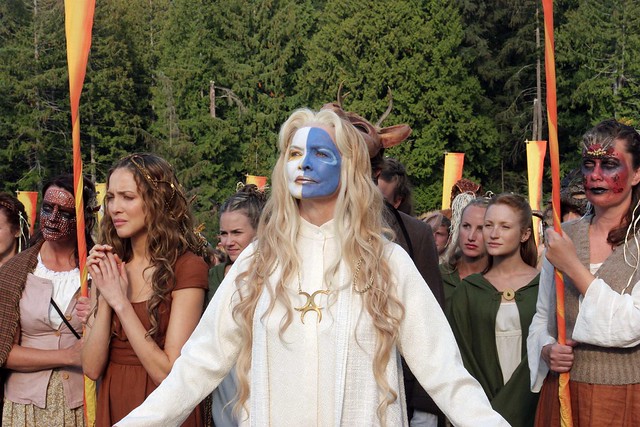Directed by Neil
LaBute.
2006. Rated PG-13, 102
minutes.
Cast:
Nicolas Cage
Ellen Burstyn
Kate Beahan
Frances Conroy
Molly Parker
Leelee Sobieski
Diane Delano
Police officer Edward Malus (Cage)
witnesses a mother and daughter get killed when an out of control
eighteen-wheeler smashes into their vehicle during a traffic stop. While on
leave following this traumatic event, he receives a letter from his former fiancée
Willow (Beahan) letting him know that her daughter is missing somewhere on the Summersisle,
where they live. It seems to be a largely self-sufficient and private farming
community. Sensing that he may be Willow’s only hope to find her little girl,
Edward travels to the island in hopes of saving the day. This is even harder
than he imagines because when he gets there no on will admit to having even heard
of her. They’re also a really tight-knit cult under the rule of Sister
Summersisle (Burstyn). To say Malus is given the run-around is putting it
lightly.
The plot’s skeleton is the same as
the 1973 original. The flesh surrounding it is something else entirely. In lieu
of the wacky approach to story-telling taken by its predecessor, this one
favors more conventional methods. It settles into being rather run of the mill
with no sense of wonder or fun. Many of the original’s outrageous elements are
completely stripped away. The rest is put through a strainer until we’re left
with the dried meat of a PG-13 thriller designed to appeal to as wide an
audience as possible.
I’m not one to automatically
disparage remakes, but this one really does pale in comparison to the original.
That, however, is not its biggest problem. The most pressing issue is that as a
standalone film it’s a rather hum-drum experience. It can be easily filed away
as yet another picture in which Nicolas Cage is kind of quirky and a bit of a
smart-alec. Nothing it does separates it from his rather large pack of terrible
movies. You know what? I’m not even blaming him, nor anyone else involved in
making this. I’m beyond that, for now. I’m blaming you John or Jane American.
That’s right. You. Why? It’s simple. All of the unique qualities of the original
were ripped from its predecessor because the powers that be think you can’t
handle it and won’t fork over your hard earned bucks to see something that
takes the less beaten path. Therefore, instead of something that embraces the
oddity that is the first movie, we get this.



No comments:
Post a Comment